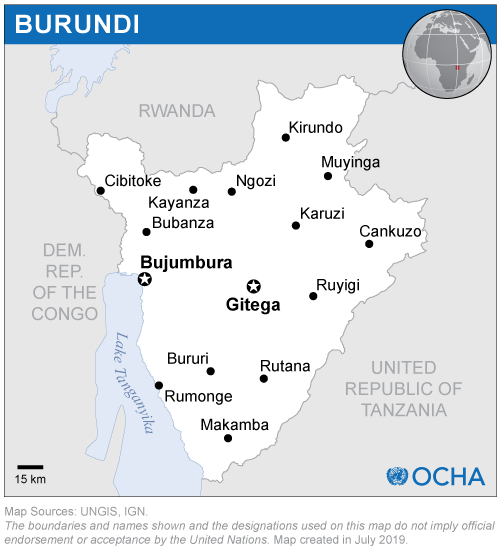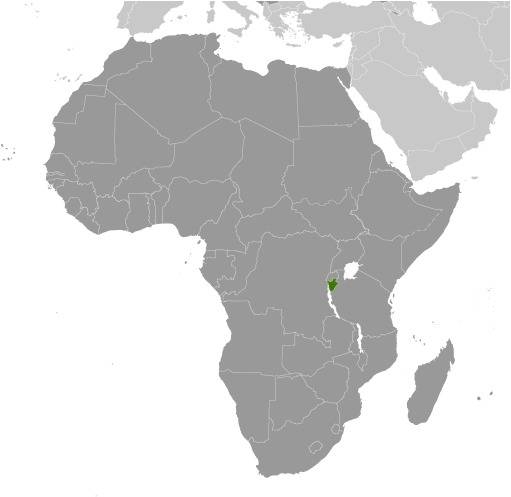
The country
Burundi is a landlocked country in Central Africa, bordering Rwanda, Tanzania and the Democratic Republic of the Congo. The country gained its independence from Belgium in 1962. Gitega is the political capital of the state, Bujumbura the commercial capital. Burundi covers an area of 27,830 square kilometers. In 2025, the country has an estimated population of about 12.3 million people. The Central African nation is one of the least developed countries in the world.
The humanitarian situation
The overall humanitarian situation in Burundi remains tense and serious human rights violations continue. Burundians are facing a humanitarian crisis characterized by food insecurity, extreme weather events and economic decline. The people of Burundi experience a triple burden: high climate risk, widespread poverty and insecurity. Even though the worst of the violence has subsided in 2025, the security situation remains precarious, with an unstable political situation and ongoing displacement outside the country.
More than 500,000 men, women and children fled Burundi in the years following the deadly clashes surrounding the 2015 presidential election. Since 2017, at least 243,000 Burundian refugees have returned to their home country.
As of March 2025, approximately 257,000 Burundians are still refugees in neighboring countries, most of whom were forced to flee after the disputed elections and violence in 2015. Burundian refugees are mainly hosted by Tanzania (104,000), Rwanda (50,000), the Democratic Republic of Congo (51,000), Uganda (42,000), and Kenya (210,000). Most Burundian refugees are completely dependent on international aid to meet their basic needs. Not included in these figures are some 42,000 Burundian refugees who have been living in Tanzania for decades and are no longer receiving assistance.
About 86,000 people are internally displaced within Burundi, mostly due to climate-related extreme weather events (as of August 2024).
As of March 2025, Burundi hosts at least 155,000 refugees, including 91,000 refugees and asylum seekers registered by the UN Refugee Agency (UNHCR) at the end of last year. The Burundian government generally cooperates with UNHCR and other humanitarian organizations in providing protection and assistance to refugees, returning refugees, and asylum seekers.
As the conflict in eastern Democratic Republic of Congo (DRC) rages on, thousands continue to cross the border into Burundi in the largest influx the country has seen in decades. More than 64,000 people have arrived since January 2025. Following the occupation of the major Congolese cities of Goma and Bukavu by Rwanda-backed M23 rebels and ongoing fighting in the DRC, some 89,000 people have fled the DRC into neighboring countries, most of them crossing into Burundi.
Meanwhile, food insecurity persists in the country, with alarming levels of malnutrition and hunger, according to the latest IPC analysis. Between November and December 2024, coinciding with the lean season, 1.9 million people were acutely food insecure at crisis levels (IPC 3) or worse, including 179,000 people at emergency levels of hunger requiring immediate food assistance. An additional 6.3 million people were classified as food insecure at stress levels (IPC Phase 2).
Between January and March 2025, coinciding with the harvest season, nearly 1.2 million people are estimated to experience IPC Phase 3 (Crisis) and none are estimated to experience IPC Phase 4 (emergency), a significant improvement from the previous period. However, an estimated 5.9 million people are still projected to be at the stress level of food insecurity (IPC Phase 2).
An estimated 484,000 children under the age of five are acutely malnourished, including 85,000 cases of severe acute malnutrition (SAM). Approximately 73,000 pregnant and lactating women are also suffering or expected to suffer from acute malnutrition.
Burundi continues to bear the brunt of climate-related natural disasters, particularly torrential rains, floods, landslides and strong winds, and is among the least prepared countries to respond to climate-induced shocks.
According to the International Organization for Migration (IOM), between 2018 and 2024, more than one million people in Burundi were affected by climate-related natural disasters, particularly torrential rains, floods, and storms, resulting in the displacement of more than 196,000 people.
From the start of the rainy season in September 2023, the El Niño phenomenon intensified the effects of human-induced climate change across the country. In 2024, more than 370,000 people were affected and more than 50,000 people were forced to flee their homes due to natural disasters, including torrential rains, generalized flooding, landslides, and overflowing lakes. Thousands of homes and schools were damaged, along with a significant portion of Burundi's food crops. The floodwaters also increased the spread of waterborne diseases.
Because there is no humanitarian response plan for Burundi this year, the number of people who are in need of assistance in 2025 is not publicly available. In 2024, about 600,000 people needed humanitarian aid, including nearly 320,000 children. In 2023, 1.5 million people relied on humanitarian assistance, including about 946,000 children.
According to the international humanitarian organization CARE, Burundi was one of the top ten forgotten humanitarian crises that received the least media attention in 2024.
 The security situation
The security situation
The internationally brokered Arusha Agreement, signed in 2000, and subsequent cease-fire agreements with armed movements ended the 1993-2005 civil war. Burundi’s second democratic elections were held in 2005, resulting in the election of Pierre Nkurunziza as president. He was reelected in 2010. In 2015 political unrest in Burundi took a fatal turn after President Nkurunziza announced plans to seek a third term.
After a controversial court decision allowed Nkurunziza to circumvent a term limit in 2015 and be reelected, mass protests and a failed coup led to violent clashes. Years of violent repression followed, including mass arrests, detentions, executions, torture and intimidation. Hundreds of thousands fled to nearby countries in search of safety.
Following the death of Nkurunziza, Evariste Ndayishimiye - from Nkurunziza's ruling party - was elected president in 2020. The government allowed the main opposition party to campaign and participate in the 2020 presidential and parliamentary votes. The elections resulted in a peaceful transfer of power but were deeply flawed, with widespread reports of human rights abuses perpetrated primarily against members of the main opposition party.
Since President Ndayishimiye came to power in 2020, there have been only limited improvements in Burundi’s human rights record. According to UN experts, despite commitments and measures taken by the government, the human rights situation in Burundi has not changed in a substantial and sustainable way.
In 2024, the UN Human Rights Council (HRC) adopted a resolution renewing the mandate of the Special Rapporteur on the situation of human rights in Burundi. However, the government continues to disregard its obligations under international law, including by denying the Special Rapporteur access to the country. The investigation by the International Criminal Court (ICC) into the situation in Burundi, which is focused on alleged crimes against humanity committed in Burundi between 2015 and 2017, continues.
Human rights groups say suspected members of opposition groups continue to disappear, many have been detained, and there have been documented cases of torture. Threats and politically motivated prosecutions also continue. A number of returning refugees have been intimidated. There are also reports of unlawful and arbitrary killings, including extrajudicial killings. Violence mainly targets journalists and members of civil society organizations, as well as opponents of the government and the ruling party, or those perceived to be opposed to either.
According to Human Rights Watch (HRW), the government continued to restrict the activities of civil society, independent media, and political opposition in 2024. The rights group reports that impunity for human rights violations persisted, including for those who committed violations during the 2015 crisis, and is exacerbated by a deteriorating security situation. HRW notes that cases of enforced disappearance and arbitrary detention remain of concern, particularly in the context of the upcoming 2025 parliamentary and local elections.
Donations
Your donation for the Burundi emergency can help United Nations agencies, international humanitarian non-governmental organizations (NGOs) and their local partners to provide water, food, medicine, shelter and other aid to the people who need it most.
Currently, there are only few active appeals for the Burundi crisis. You may also consider making an unearmarked donation.
- UNHCR: Burundi
https://www.unhcr.org/countries/burundi - World Food Programme: Burundi
https://www.wfp.org/countries/Burundi - Norwegian Refugee Council (NRC): Donate
https://www.nrc.no/make-a-difference-today/ - International Rescue Committee (IRC): Donate
https://help.rescue.org/donate/ - UNICEF: Burundi appeal
https://www.unicef.org/appeals/burundi - CARE International: Donate
https://www.care-international.org/donate - UN Crisis Relief: Central Emergency Response Fund
https://crisisrelief.un.org/t/cerf - Médecins Sans Frontières (MSF): Donations
https://www.msf.org/donate - Oxfam International: Donate to the Global Emergency Fund
https://www.oxfam.org/en/donate/global-emergency-fund
To find other organizations to which you can donate, visit: Humanitarian Crisis Relief, Refugees and IDPs, Children in Need, Hunger and Food Insecurity, Medical Humanitarian Aid, Vulnerable Groups, Faith-Based Humanitarian Organizations, and Human Rights Organizations.
Further Information
- UN OCHA: Burundi (in French)
https://www.unocha.org/burundi - ACAPS: Burundi Complex Crisis
https://www.acaps.org/en/countries/burundi - UNHCR Operational Data Portal (ODP): Burundi situation
https://data.unhcr.org/en/situations/burundi - International Crisis Group: Burundi
https://www.crisisgroup.org/africa/great-lakes/burundi - Human Rights Watch: World Report 2025: Burundi
https://www.hrw.org/world-report/2025/country-chapters/burundi - Human Rights Watch: World Report 2024: Burundi
https://www.hrw.org/world-report/2024/country-chapters/burundi - Amnesty International Report 2023/24: Burundi
https://www.amnesty.org/en/location/africa/east-africa-the-horn-and-great-lakes/burundi/report-burundi/ - US State Department: 2023 Country Reports on Human Rights Practices: Burundi
https://www.state.gov/reports/2023-country-reports-on-human-rights-practices/burundi - International Criminal Court: Situations: Burundi
https://www.icc-cpi.int/situations/burundi
Last updated: 10/03/2025